A dry scalp is more serious than you think. It dries can also stunt hair growth and lead to dandruff. So learning how to moisturize dry hair and scalp is essential.
I’ve always struggled with a dry scalp. It’s not that rare either. A lot of people have a dry scalp problem and don’t even realize it.
Your scalp contains glands just like your skin that secrete natural oils or sebum to keep things moisturized.
In some people, these glands don’t produce enough sebum, causing dry scalp and hair.
I’ve noticed that if you have dry skin, you’re more likely to have a dry scalp.
Related: How to wash natural hair
Related: How to plop hair
Related: How to hair spa at home
Some people struggle with hairfall and dandruff and don’t even connect it with a dry scalp.
Yes, a lack of hydration can be a leading cause of many hair troubles.
An excessively dry scalp can lead to flake-formation and dead skin cell accumulation.
This in turn can lead to dandruff and provide a perfect environment for fungal infections to develop.
Also, this excess flakiness and clog your hair follicles, preventing any nutrition from reaching them and stopping healthy hair growth.
How To Moisturize Dry Hair And Scalp
Get To The Root Of Dryness
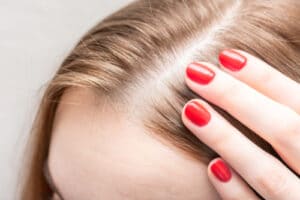
As I’ve mentioned before, insufficient sebum production can lead to a dry scalp.
But what exactly caused this imbalance on the scalp’s natural oils? It’s very important to figure this out as knowing the cause of a dry scalp can help you treat it better.
Dry scalp can be caused due to:
- Using harsh alcohol or surfactant-rich products like styling creams, shampoos, etc. that wrecks the scalp's pH levels and strips natural oils from it.
- Skin conditions such as seborrheic dermatitis that causes flaking, dryness, and irritation.
- Fungal infections especially due to malassezia, a yeast that can be found on the scalp.
If your scalp is not producing enough sebum or natural oil, then it’s difficult for your strands to get hydrated too.
You’ll have to first see what’s the root cause of dry scalp before you try a treatment.
If it’s the products then just substituting your shampoo or conditioner might be sufficient.
But if you’ve got psoriasis or dermatitis, then a medicated shampoo or even a doctor's visit might be necessary.
Apply Scalp Specific Hair Oils
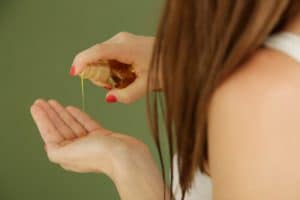
There are certain hair oils that work wonders at nourishing your scalp and preventing it from getting dry.
You can try applying the following carrier oils to your hair to bring back it’s lost moisture.
- Argan oil
- Jojoba oil
- Sweet almond oil
- Coconut oil
- Castor oil
- Olive oil
But wait a minute! Before you start using these oils be careful not to overdo them. Especially if you have open pores or acne.
Some of these oils, like coconut oil can worsen the situation.
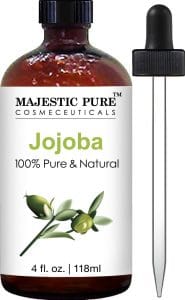
In my opinion Jojoba oil is the best oil for dry scalp. It’s non-comedogenic. It doesn’t cause a lot of scalp build-up. And the best part? It’s very close to your skin’s natural oil makeup.
It’s also packed with vitamin E and omega-3 fatty acids that are great for your hair!
I always apply these oils at bedtime and massage them thoroughly on my roots. I then wash my hair the next morning.
But if you’re in a hurry you can apply a few drops of these oils to freshly toweled hair after you shower.
The wet hair strands won’t absorb too much oil and it won’t make your hair look greasy.
“But oils don’t suit my skin!”
Yes, this is a common issue. And if this is your case then you can use a lightweight hair serum instead of hair oil.
Expert Tip: If you want your hair to not look greasy and for the oils to actually penetrate to your scalp, try applying them using the tip of an earbud.
Choose A Sulfate-Free Shampoo

Ah, sulfates! They have become the villain of every hair story ever. And so it’s the case here.
Sulfates or rather sodium lauryl sulfate (SLS) and sodium laureth sulfate (SLES) are very common shampoo ingredients.
They are surfactants or ingredients whose main job is to create soap and lather to effectively wash dirt, dust, and grime from your locks.
But the problem with sulfates is that they work a tad too well. They do not just clean dirt from your hair but strip the scalp of natural oils too.
So I make sure whatever shampoo I’m buying doesn’t have SLS or SLES. They’re bad enough on regular scalp and hair textures.
But on dry scalp? Boy, can they wreak havoc on your hair!
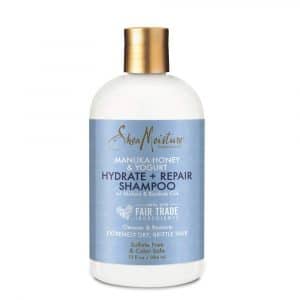
You can try a good sulfate-free shampoo for dry hair that contains ingredients like aloe vera, natural oils, biotin, etc. as these are known to nourish hair.
If you’re facing itchiness and flaking as well, you can try shampoos with pyrithione zinc or ketoconazole to reduce the scalp build-up.
I also use a clarifying shampoo once a month to remove any build-up caused by styling products and dead skin cells.
Related: Best Shampoo For Dry, Itchy Scalp
Remove Product Build-Up By Using Astringents
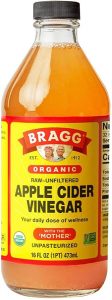
Speaking of product build-up… You need to get rid of it. Pronto!
No matter how many oils you’re using or how expensive a hair mask you’re applying, if you’ve got a layer of debris blocking your hair follicles, it’s not going to make a difference.
So I always use astringents to deep cleanse your scalp.
The easiest way to do this is to rinse your hair with a solution of water and apple cider vinegar every fortnight.
You can also use tea tree oil mixed with aloe vera or another carrier oil.
These astringents can be harsh. And if you use them directly on your scalp they will dry it out further. So always use a moisturizing buffer ingredient.
Try A Scalp Mask Or Targeting Treatments
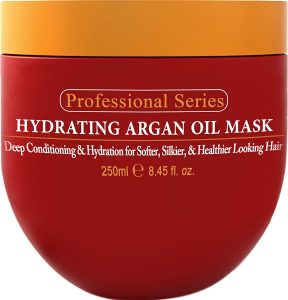
What do you do if your skin feels dehydrated or dull? Use a face mask, right? It’s a similar thing you have to do to moisturize dry hair and scalp.
There are branded scalp treatments and hair masks in the market.
And some of them contain ingredients like argan oil, shea butter, honey, biotin, peptides, proteins, aloe vera and more to nourish your tresses.
But if you’re in a hurry, just look into your pantry. You’ll find several ingredients you can use for a DIY, homemade hair mask.
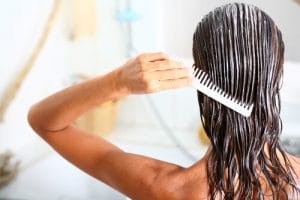
Some of my favorite moisturizing, DIY hair masks include:
- Coconut oil
- Aloe vera
- Yogurt and eggs
- Mashed bananas
- Avocado
- Honey
You can apply these masks to your hair from root to tip and cover your locks with a shower cap or hot towel.
I sometimes use a hair steamer or thermal cap to help the ingredients penetrate deep into my strands before washing it off.
Cut Back On The Styling Products
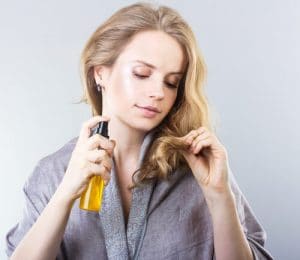
We dry scalp folks are trapped in a sort of terrible cycle. We use a lot of products to keep scalp moisturized. These cause product build-up and then the dry flakes worsen.
But there is a way out. You can cut back on certain styling products, or rather certain ingredients.
Hairsprays, serums, styling gels, dry shampoos, and pomades may seem innocuous enough but they usually contain perfume and alcohol.
Both these ingredients dry out your scalp and can even trigger inflammation. So cut down on your use of these hair styling products.
And don’t get me started on conditioners!
A lot of rinse-off and leave-in conditioners contain silicones, usually in the form of Dimethicone.
Now silicones are ingredients that form a slippery layer on your hair, making it appear more shiny and smooth. And they are successful, to some extent, in reducing frizzy hair.
But unfortunately, silicones can increase build-up and clogging of hair follicles in the long run.
Give Regular Scalp Massages
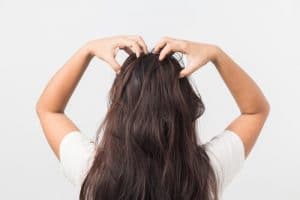
I feel head massages are very underrated. Yes, they feel SO good. But did you know that they help make your hair healthy too?
Regular massage increases blood circulation to the scalp. This in turn, signals the hair follicles to start entering the growth phase, causing new hair to flourish.
You can massage your scalp when you’re applying hair oil as that provides a bit of lubrication.
Remember, never use your nails, as the sharp edges can make dandruff and flaking worse.
Just use the pads of your fingertips to massage your scalp in slow, circular motions.
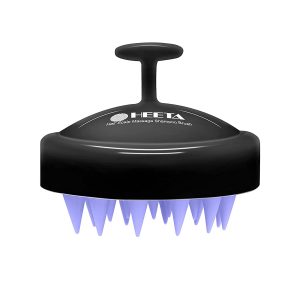
I recently also invested in a scalp brush. And it has been a game changer!
These brushes do not just give your scalp a good massage, they also help in removing build-up when you’re using them in the shower.
Take Hair And Skin Supplements
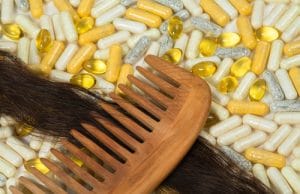
Sometimes, you can take care and moisturize dry hair and scalp all you want, but it doesn’t seem to make a difference.
It might be due to a nutritional deficiency in your body. And no amount of hair masks and massages can make up for that.
Some of the popular supplements for dry scalp and hair include:
- Vitamin E - Vitamin E acts as a natural antioxidant and reduces inflammation
- Collagen - Collagen supplements contain amino acid peptides that increase production of collagen and elastin in skin cells.
- Hyaluronic Acid - This supplements helps maintain moisture in your hair and scalp
- Biotin - Biotin repairs hair shaft, helps create keratin and strengthens hair
- Omega-3 Fatty Acids - These reduce inflammation, promote hair growth, and increase blood circulation to hair follicles.
Why is my scalp so dry even when I moisturize it?
Scalp skin is very thin and sensitive - The scalp is a very thin skin that is easily irritated. When your scalp is dry, the natural oils that are produced to keep it hydrated are ineffective. This leads to an intensified dryness and Baldwin's dermatitis, which is a skin condition that commonly affects the scalp.
Moisturizers can't penetrate the skin - Moisturizers are designed to moisturize the skin surface only. They are not effective in penetrating into the deeper layers of the skin where moisture is actually needed. This leaves your scalp feeling dry and irritated even after you apply moisturizer.
The scalp oil production has reduced- Scalp oil is a natural oil that helps keep your hair healthy and moisturized. When the scalp is dry, this oil production decreases, which leaves your hair vulnerable to further damage from dryness.
If you experience chronic dryness or irritation on your scalp, it might be a good idea to see a dermatologist for evaluation and treatment.
In the meantime, make sure to apply a moisturizer that specifically targets the skin on your scalp every day and pick an antioxidant-rich product to use as your face moisturizer at night.
Dry hair can lead to a lot of issues such as hair fall, dandruff, breakage, tangles, etc. So it’s important to know how to moisturize dry hair and scalp.
These are some easy remedies you can use at home. They don’t require any fancy equipment or products and usually show results in 2-3 weeks.
Also Read:

